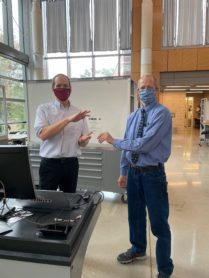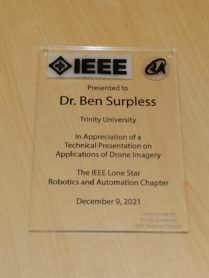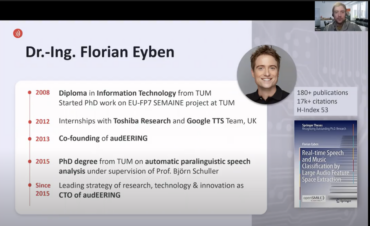This page is a compendium of past meetings. Media (videos of meetings, slides, etc) will be available for 3 months after the meeting.
Jan 24, 2024 – What is the Next Industrial Revolution?
Speaker: MengChu Zhou (Distinguished Lecturer, Fellow of IEEE)
Dr. Zhou joined the Department of Electrical and Computer Engineering, New Jersey Institute of Technology in 1990, and is now a Distinguished Professor. His interests are in intelligent automation, complex systems and networks, Petri nets, Internet of Things, edge/cloud computing, and big data analytics. He has over 900 publications including 12 books, over 600 journal papers including over 500 IEEE Transactions papers, 30 patents and 29 book-chapters. He is a recipient of Excellence in Research Prize and Medal from NJIT, Humboldt Research Award for US Senior Scientists from Alexander von Humboldt Foundation, and Franklin V. Taylor Memorial Award and the Norbert Wiener Award from IEEE Systems, Man, and Cybernetics Society, Distinguished Service Award from IEEE Robotics and Automation Society, and Edison Patent Award from the Research & Development Council of New Jersey. He is Fellow of International Federation of Automatic Control, American Association for the Advancement of Science, Chinese Association of Automation and National Academy of Inventors.
Talk: What is the Next Industrial Revolution?
Human beings have experienced two major industrial revolutions. The first one took place in the 19th century, which replaced muscle power from humans and animals with mechanical power. The second one started in the middle 20th century, which provided people and societies with Internet. It was built with the technologies from computing, communication, networking and information storage. Both offered unprecedented productivity increases. What will be the next one? This talk intends to answer this question by presenting some recent development of Internet of Things (IoT) and smart systems. IoT was selected by IEEE as a major initiative to develop and advance over the next few years. Several recent studies have predicted the huge growth of IoT and tremendous benefits to the world economy. It was expected that 26 billion IoT units would be installed by year 2020, generating $300 billion in revenue. The IoT will generate an additional $1.9 trillion in economic value. We plan to present a system engineering approach to Internet-of-Things-based smart systems and their applications to smart manufacturing, smart cities, smart gird, smart logistics, and smart healthcare services.
Recording: video recording (available for 90 days)
Aug 24, 2023 – Humanoid Robots
Leo Chen, director of US operations for Engineered Arts.
July 27, 2023 – Empowering robots to create natural and empathic interactions via voice through emotion AI
Dr. Florian Eyben, CTO of audEERING.
This joint meeting with the IEEE Computer Chapter of the Lone Star Section featured Dr. Florian Eyben, CTO of audEERING.
His presentation focussed on empowering robots to create natural and empathic interactions via voice through emotion AI.
May 1, 2023 – The DaVinci Surgical Robot: History of Robotic Surgery and where we are going
Dr. Naveen Kella – Founder, The Urology Place
Dr. Kella presented this joint meeting with the IEEE Engineering and Medical Biology Chapter of the Lone Star Section. Dr. Kella is the most experienced robotic prostate surgeon in San Antonio as well as one of the most experienced in the nation. Dr. Kella discussed the history, controversies, and future of robotic surgeries.
Feb 24, 2023 – NEED FOR INFORMATION TECHNOLOGY AND AUTOMATION ON THE FUTURE BATTLEFIELD
Regular meeting of the IEEE EMB Chapter of the Lone Star Section, followed by a technical talk. Also held jointly with the Robotics and Automation Chapter and the Life Member Affinity Group.
Feb 23, 2023 – Indy Autonomous Challenge Winners
Andrea Ticozzi – Polytechnic University of Milan
Andrea Ticozzi of the Polytechnic University of Milan and the technical lead of team PoliMOVE, winner of three out of four Indy Autonomous Challenge events (Setting a new autonomous speed world record for a racetrack!), presented on the team’s technologies and experiences as part of the Indy Autonomous Challenge racing series. Mr. Ticozzi presented live via zoom from Italy.
Nov 4, 2022 – Joint meeting of the UTSA Student Branch, the RAS Chapter and the SMC/AES/SYSC Chapter
Dr. Premachandra of Shibaura Institute of Technology
Topic: Voice-based victim searching in disaster-stricken areas using drone
Drone searches for victims in disaster-stricken areas have been mainly conducted by analyzing images from cameras mounted on drones. But in disaster-stricken areas, victims may not be able to recognize victims from images, due to situations such as being covered in sediment and debris. Therefore, as a method of searching for victims who are not captured by the camera, a method of determining the location of the victim by mounting a microphone device on a drone and detecting human voices from the collected sound is being studied. This talk will discuss the approaches of searching disaster victims by voice processing and related automatic flight control technologies for the searching activities.
Biography:
Chinthaka Premachandra (Senior Member, IEEE) was born in Sri Lanka. He received the B.Sc. and M.Sc. degrees from Mie University, Tsu, Japan, in 2006 and 2008, respectively, and the Ph.D. degree from Nagoya University, Nagoya, Japan, in 2011.
He is a Professor in the Department of Electronic Engineering, Graduate School of Engineering, Shibaura Institute of Technology, where he is currently the Manager of the Image Processing and Robotic Laboratory. His research interests include AI, UAV, Image processing, Audio processing, Intelligent Transport Systems (ITS), Mobile Robotics.
In addition to IEEE, Dr. Premachandra is also a member of IEICE, Japan; SICE, Japan; RSJ, Japan; and SOFT, Japan. He received the IEEE Sensors Letters Best Paper Award from the IEEE Sensors Council in 2022, and IEEE Japan medal from the IEEE Tokyo section in 2022. He also received the FIT Best Paper Award and the FIT Young Researchers Award from IEICE and IPSJ, Japan, in 2009 and 2010, respectively. He has served many international conferences and journals as a Steering Committee Member and an Editor, respectively. He is currently serving as an associate editor for IEEE Robotics and Automation Letters(R-AL) and IEICE Transactions on Information and Systems. He is the Founding Chair of the International Conference on Image Processing and Robotics (ICIPRoB) which is technically co-sponsored by the IEEE.
Sept 28, 2022 – Fluid Exoskeletons for Self-Assistive and Resistive Exercise
Dr. Emma Treadway spoke on “Fluid Exoskeletons for Self-Assistive and -Resistive Exercise” to the IEEE Robotics & Automation Society – Lone Star Chapter and interested students.
Program Description: Exoskeletons are promising for applications ranging from motor rehabilitation to active assist and zero-gravity exercise. In typical motorized exoskeletons, high torque requirements require the use of heavy motors. Fluid actuators on the other hand have relatively high power density (high power relative to their weight) and open the door to new rehabilitation and exercise paradigms inspired by the use of fluid transmissions. This talk explores the development and control of exoskeletons exploiting fluid transmissions to inspire two paradigms for exercise and rehabilitation: self-assist and self-resist. In self-assist, power is transmitted across the wearer’s body from a stronger joint to a weaker one via a fluid transmission in order to provide assistive forces during movement; this paradigm is attractive for applications such as stroke rehabilitation, in which patients often have stronger and weaker limbs. Self-resist on the other hand employs a fluid link to allow muscles to work against each other during exercise. Because this resistance exercise can be achieved without external grounding, it has potential application for zero-gravity exercise.
Bio: Dr. Emma Treadway is an Assistant Professor in the Department of Engineering Science at Trinity University. She received her M.S.E. and Ph.D. degrees in Mechanical Engineering from the University of Michigan, Ann Arbor in 2017 and 2019, respectively, and the B.S. degree in Engineering Science from Trinity University in 2011. Her research explores haptics and physical interactions between humans and
robots.
ROS2: Ready for Prime Time?
August 25, 2022
Our hybrid meeting featured a video from the Santa Clara Valley RAS Chapter (Available on ieee.tv) followed by a panel discussion featuring several local ROS users discussing differences and considerations in upgrading.
July 28, 2022 – Robot Manipulators in Space
June 23, 2022 – Cybersecurity Concerns of Industrial Systems
Dr. Victor Murray
Our meeting featured a presentation on Industrial Cybersecurity from Victor Murray, manager of the Cyber-Physical Systems Security Section at Southwest Research Institute (SwRI). He is a Certified Information Systems Security Professional (CISSP) whose background includes performing risk assessments, penetration tests, and developing secure systems. His presentation will take a closer look at vulnerabilities and mitigation strategies for iROS and other computer controlled automation systems.
Program:
Robotics and industrial automation systems can be exposed to cybersecurity attacks but the threats are different than for personal or business systems. This presentation considers vulnerabilities and mitigation strategies for iROS and other computer controlled automation systems.
News headlines occasionally tell of personal data leaks or financial breaches but actually multiple cyber-attacks are published on a daily basis. While the vast majority of cyber-attacks focus on traditional IT networks, there are many examples of attacks designed to exploit industrial systems.
This presentation will review some attacks that grabbed headlines including Colonial Pipeline, Stuxnet, and Triton Malware attacks. Unfortunately, bleeding edge industries, including robotics and industrial control, tend to be laser focused on functionality at the expense of cybersecurity. There are countless examples in other industries (blue tooth, Wi-Fi, CAN bus) where similar evolutions have occurred:
- No security, system just functions in the clear
- Technology takes off in popularity
- Technology gets hacked
- System gets re-designed to address security.
ROS-I for example commonly sends data over TCP/UDP connections in the clear. This can mean that if an attacker gets access to a ROS-I network then they have full control over your system. ROS 2 is moving towards addressing this with DDS-security, but this is not commonly used for ROS-I.
Mar 24, 2022 – Tour of XYREC Robot Facility
Feb 24, 2022 – Autonomous Robotics for Lunar Landing Pad Construction
The presentation described civil engineering processes using autonomous robotics for excavation and site preparation for constructing a lunar landing pad. A concept of operations for landing pad construction was presented, centered around a regolith melting and brick placement technology being developed by San Antonio based Astroport Space Technologies. Inc. Additional technologies in development by Astroport for habitat and lunar infrastructure construction were also discussed.
Sam Ximenes is a Space Architect with over 30 years’ experience in the aerospace industry with NASA, DoD, and international space programs. He is currently CEO of Exploration Architecture Corporation (XArc), a space architecture consulting firm he founded in 2007. The firm specializes in commercial spaceport development and design, and space systems development for space exploration initiatives for planetary surface systems for habitation and human settlement He is also Founder and Board Chair of WEX Foundation, a non-profit organization for advancing careers in space exploration through SpaceSTEM education. His latest venture is CEO of Astroport Space Technologies, Inc., founded in 2020 as a wholly owned subsidiary of XArc to develop lunar construction technologies for emplacement of critical elements of lunar surface infrastructure.
Jan 27, 2022 – Indy Autonomous Vehicle Challenge – Dr. Kris Kozak
Program Information:
The Indy Autonomous Challenge (IAC) was ambitiously conceived of as a wheel-to-wheel race of fully autonomous race cars on the Indianapolis Motor Speedway (IMS) oval. Although a multi-car race didn’t materialize as envisioned, an exciting and boundary pushing competition was still held on schedule at IMS on October 23, 2021. The success of that IAC competition has since led to a follow-on competition at the Las Vegas Motor Speedway during the 2022 Consumer Electronics Show (CES) on January 7: the Autonomous Challenge at CES. For this presentation, Dr. Kris Kozak will give a behind the scenes look at the process that led up to the original competition, provide insight into the technologies used in the cars, and touch on some of the unique challenges that were faced by competitors.
Speaker Information:
Kris is an experienced researcher, developer and problem solver with a demonstrated history working globally to provide customized solutions in the dynamic fields of self-driving & autonomous vehicles, robotics, systems and software. Skilled in vehicle localization, control and perception with high-level experience developing software in C++, Matlab and Python. Kris earned his Doctor of Philosophy (Ph.D.) in Mechanical Engineering with a focus on robotics from Georgia Institute of Technology and currently serves as vice-chair of the LSS Robotics and Automation Society Chapter. This past year he was involved in the Indy Autonomous Challenge. He gave his presentation virtually.
Dec 9, 2021 – The application of drone imagery and structure-from-motion modeling to 3D volume analysis: a new era of scientific investigation – Dr. Ben Surpless
Joint Meeting of Trinity IEEE Student Branch and IEEE Robotics & Automation Chapter
Abstract: Unmanned aerial vehicles (UAVs) have become an increasingly integral part of industrial operations and scientific investigations. As costs of operating and maintaining UAVs have come down over the past decade, scientists are now able to inexpensively, efficiently, and accurately collect remotely-sensed data from localities once thought inaccessible. When combined with recent advances in hardware and software, scientists across a range of disciplines can now address research questions once thought, literally, out of reach. In addition to reviewing recent changes in drone use and operation, Surpless will explore how drone data are collected and analyzed in the context of a real-world geologic investigation.
Speaker: Ben Surpless is Professor of Geosciences at Trinity University, where he has performed research with students since 2005. Ben earned his Ph.D. in geosciences from Stanford University and has been awarded several National Science Foundation awards to support his research with students. He was awarded the 2013 Junior Faculty Teaching and Research Award and the 2020 Z.T. Scott Fellowship, for excellence in teaching and advising.


Sept 23, 2021 – Renu Robotics Tour
The September meeting of the Robotics and Automation Chapter was at Noon on Thursday, Sept 23. The meeting was a presentation and tour of Renu Robotics,a San Antonio manufacturer of robot tractors for solar farm vegetation control.
June 24, 2021 – San Antonio – City of Innovation
Location: Remote (Zoom)
Agenda: At this meeting, we heard from Iris Gonzalez about recent robotics startup companies and related activities.
May 27, 2021 – Academic Robotics Research in San Antonio
Location: Remote (Zoom)
Agenda: At this meeting, we heard from our academic members about research programmes in San Antonio in robotics, including:
- University of Texas at San Antonio (UTSA)
- Dr. Patrick Benavidez
- Mr. Daniel Brun
- Trinity University
- Dr. Kevin Nickels
- Dr. Emma Treadway
- University of the Incarnate Word (UIW)
- Mr. Srikanth Vemula
- St. Mary’s University
- Dr. Dante Tezza
Apr 22, 2021 – Robotics Research at Southwest Research Institute
- Location: Southwest Research Institute
- Speakers: Paul Evans, P.E., Director at Southwest Research Institute, and David Anthony, Senior Research Engineer, Southwest Research Institute
- Joint Meeting: UTSA Student Branch, Robotics & Automation Society; Lone Star Section, TEMS Chapter
- Agenda: Mr. Evans and Dr. Anthony reviewed some of the robotics and automation work that SwRI has conducted in San Antonio.
Mar 25, 2021 – Organizational Meeting
- Location: San Antonio Museum of Science and Technology
- Agenda: At this meeting, we discussed the goals and objectives of the chapter, logistics and procedures, and took nominations for officers.

